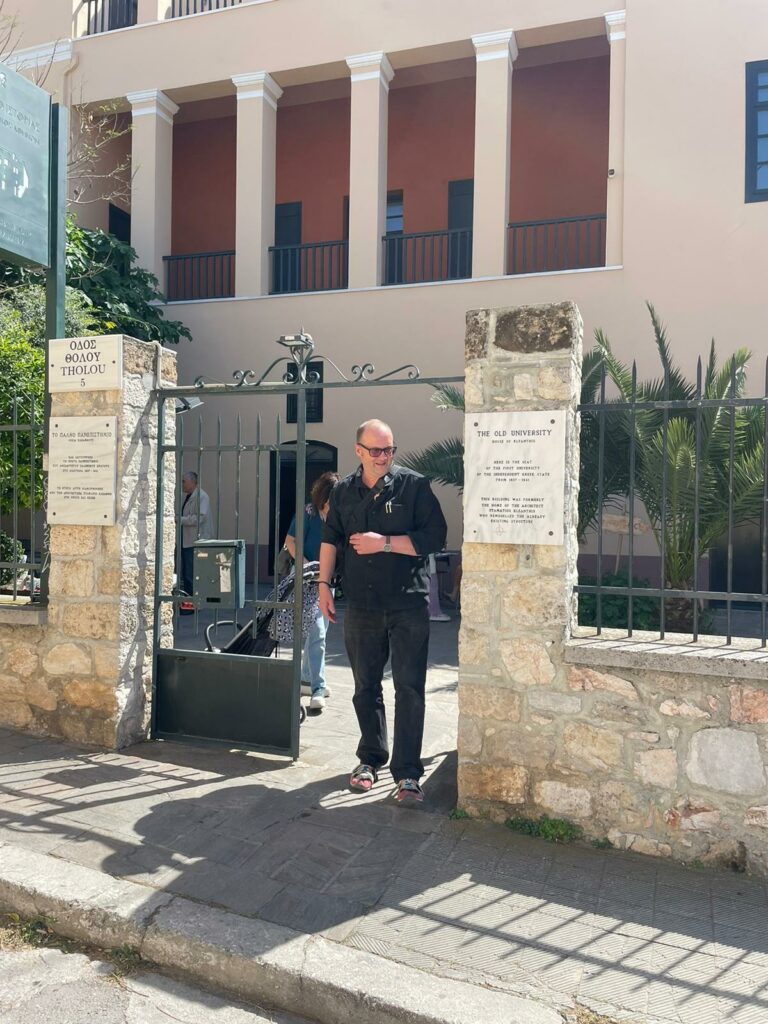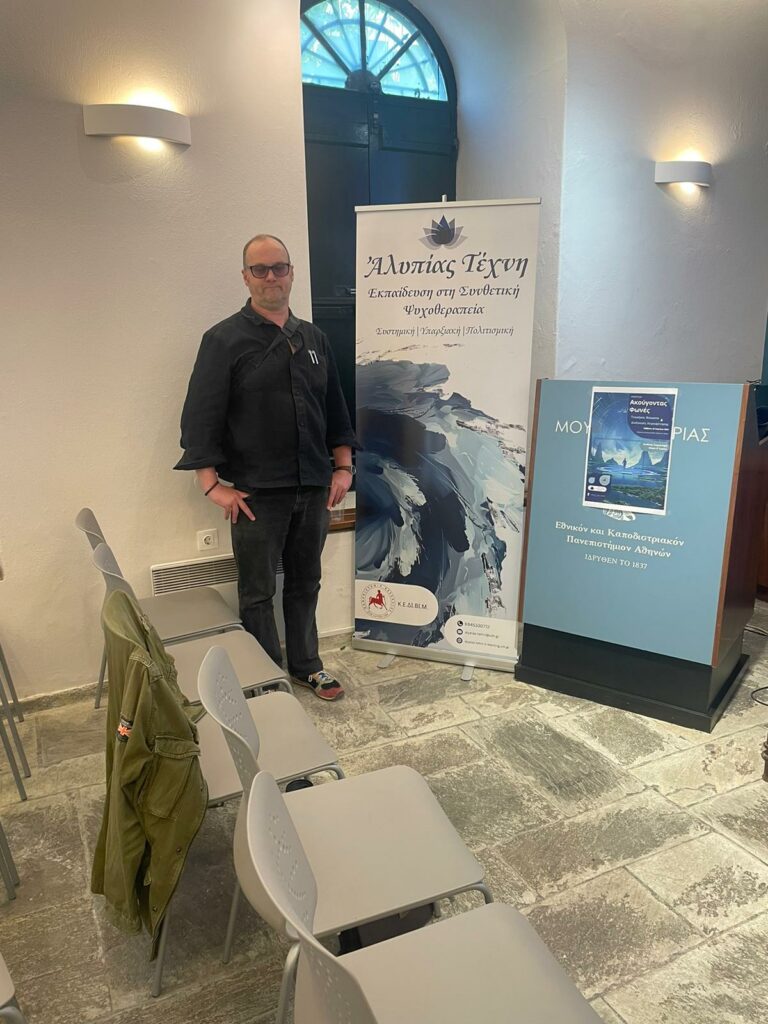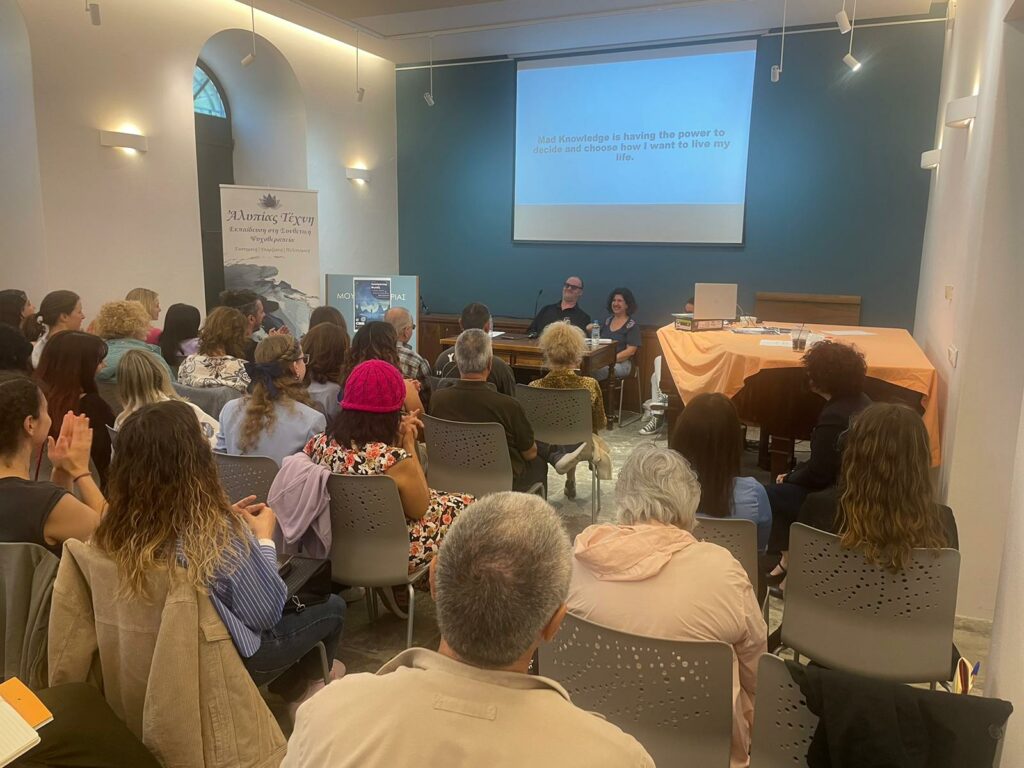Editor’s Note: This article originally appeared on Mad in Ireland. The author, Chairperson of Hearing Voices Network Ireland Owen Ó Tuama, talks about the joy and power of community for voice-hearers around the globe.
Recently I as Chairperson of Hearing Voices Network Ireland (HVNI) got to spend some time with Hearing Voices Network Athens (HVNA), in Athens. I received a warm and loving welcome from the Network there, participated in one group, would have liked to join a second, if not for an episode. We also played music—doura & guitar—ate together and hung out at the HVNA premises in Athens. There were lots of hugs and laughter, as well as the serious business of who we are.
 The HVN Athens/Greece has approximately 60 members which, like HVNI hold a monthly steering Committee. They organise two self-help groups for voice-hearers in Athens City, also Herakleion, Chania, Agrinio, & Thessaloniki. There are two self-help groups for family and friends in Athens with potentially a third one to come. There is a group for collaborative practice and self-education for mental health professionals and trainees. There are 3000 people on the HVNG newsletter list.
The HVN Athens/Greece has approximately 60 members which, like HVNI hold a monthly steering Committee. They organise two self-help groups for voice-hearers in Athens City, also Herakleion, Chania, Agrinio, & Thessaloniki. There are two self-help groups for family and friends in Athens with potentially a third one to come. There is a group for collaborative practice and self-education for mental health professionals and trainees. There are 3000 people on the HVNG newsletter list.
The Athens network host many extracurricular social, arts, and café groups also. There is a yearly seminar. I was invited to be part of one, hosted by HVNA and the psychology department of the University of Thessaly. Other seminars of HVNA have been in mental health hospitals—including on the infamous psychiatric hospital on the island of Leros, which in 1989 became internationally known for the maltreatment of patients and embezzlement of funds. Also seminars have been held with user & family associations, NGOs, and universities.
 HVNA have collaborated with Initiative for a Polymorphous Movement for Mental Health, family associations for mental health, collective worker’s publishing houses in Athens, city movements, events, discussions in organisations and political places, etc. They have published or intend to publish titles by Joanna Moncrieff, Lucy Johnstone, & others in the field of critical psychiatry.
HVNA have collaborated with Initiative for a Polymorphous Movement for Mental Health, family associations for mental health, collective worker’s publishing houses in Athens, city movements, events, discussions in organisations and political places, etc. They have published or intend to publish titles by Joanna Moncrieff, Lucy Johnstone, & others in the field of critical psychiatry.
The aims of Hearing Voices Networks worldwide are the same, that is to provide support, foster acceptance, meaning-making & metaphor to the condition of hearing voices, for voice-hearers and their family and friends. We prefer the term ‘voice-hearers’ rather than ‘psychosis’ or ‘schizophrenia’ as the former term is less stigmatising and more human, common, and everyday.
As HVNA have said in their article for Asylum Magazine (Spring 2018, “Spreading the word—Eight Years of HVN Greece, Creating Space for Our Voices”) what the HVN do is “a vivid, autopoietic system that aims at producing meaning and therefore life”. It states that we as psych survivors “have been violently attacked from neoliberal politics that aim to destroy the community”. The HVN Movement aims to keep people connected. As the HVN have stated, “there is no life without connection, there is no life for human beings without meaning”. Voice-hearers participate at all levels of our actions, which empowers us. Voice-hearers challenge ourselves by exposing personal issues and, speaking through our experience, present a new perspective about ‘psychosis’ to professionals. A more human approach is adopted. Our community work brings us in touch with other social movements such as associations for human rights, antifascists movements, etc.
To quote: “a recovery movement incorporates pain, experiences significant turning points, and enjoys the benefit of companions who chart their own paths. The pain concerns more people than the person directly experiencing psychosis; included are also family members called to stand in support and manage an endless series of dilemmas, personal anxieties, fears and the duty for responsible action as prescribed by society. Also included is, the mental health professional, who is faced with the same endless series of dilemmas, personal anxieties, fears and the mandate for responsible action issued by society; and, last but not least the ordinary citizen-viewer, who is coming face-to-face with an unfamiliar condition usually stigmatised by fear, in response to which s/he is invited to reconsider ethical, ideological and personal self-evident beliefs in what is also a confusing challenge to overcome oneself.”
All HVN offer self-help groups. Those groups are not in themselves a form of therapy; rather they offer therapeutic support and education.
Experience shows that recovery is not feasible unless there are some important others available, those who will believe in the reality of the experience, who will feel the pain and suffering experienced and who will trust that recovery is possible despite the mythology about incurable schizophrenia and chronic neurodegenerative diseases that the medical gospel presents. To quote Marianna of HVNA, sister to a voice-hearer; ”things are more difficult for anyone who has suffered the disrespect and the irrational violence of a system that is unresponsive and places preconceptions, trade interests and insecurities and the contributions of insurance funds before human beings.”
The HVN Greece article in Asylum Magazine also includes a paragraph with the heading ‘The recovery of the Mental Health professional’ which quotes U. Galiberti, who points out that, mental health professionals, deprived as they have been of their own humanity, attempt to explain man objectively like any natural phenomenon.
And in conclusion, it is important to remember that ”when the ruling psychiatric practice is dominated by one-way institutionalisation and suppression, the Network of Voice-hearing People in Greece Advocates alternative ways of dealing with mental discomfort through searching for meaning in the discomfort.”

“Overall, we strongly believe that the HVM offers a paradigm shift (in the Kuhnian sense) in the area of mental health, that it opens new horizons for a different and innovative understanding of people who have been diagnosed with schizophrenia; and most importantly: IT WORKS!”
Laugh, Love, Always.











